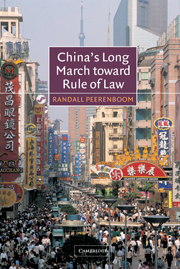Book contents
- Frontmatter
- Contents
- Preface
- List of abbreviations
- 1 Introduction
- 2 The evolution of rule of law in China: the role of law in historical context
- 3 Post-Mao reforms: competing conceptions of rule of law
- 4 Rule of law and its critics
- 5 Retreat of the Party and the state
- 6 The legislative system: battling chaos
- 7 The judiciary: in search of independence, authority, and competence
- 8 The legal profession: the quest for independence and professionalism
- 9 The administrative law regime: reining in an unruly bureaucracy
- 10 Rule of law and economic development
- 11 Rule of law, democracy, and human rights
- 12 Conclusion: the future of legal reform
- References
- Index
4 - Rule of law and its critics
Published online by Cambridge University Press: 20 July 2009
- Frontmatter
- Contents
- Preface
- List of abbreviations
- 1 Introduction
- 2 The evolution of rule of law in China: the role of law in historical context
- 3 Post-Mao reforms: competing conceptions of rule of law
- 4 Rule of law and its critics
- 5 Retreat of the Party and the state
- 6 The legislative system: battling chaos
- 7 The judiciary: in search of independence, authority, and competence
- 8 The legal profession: the quest for independence and professionalism
- 9 The administrative law regime: reining in an unruly bureaucracy
- 10 Rule of law and economic development
- 11 Rule of law, democracy, and human rights
- 12 Conclusion: the future of legal reform
- References
- Index
Summary
Rule of law is not without its critics. Skeptics claim that the efforts to promote rule of law in China are likely to fail, just as the earlier attempts of the law and development movement in the 1960s and '70s to export rule of law to developing states failed. Some PRC scholars caution that the rule-of-law movement has been largely a top-down effort and thus is not likely to be supported when legal reforms begin seriously to restrict the authority of the ruling regime. They also worry that as a product of modern Western states, rule of law cannot be transplanted to China, or that implementing rule of law will disrupt the existing social order and hence may be too costly. Critiques of rule of law from leftists in China emphasize the class nature of law, while Critical Legal Studies scholars (CRITS) abroad contend that law is a mask for oppression and serves the interests of the ruling elite. Even liberal reformers worry that in the absence of democracy and pluralistic forms of political participation, implementing rule of law will serve authoritarian ends and bolster the legitimacy of the Party. Others, as will be discussed in Chapter 10, question whether China needs rule of law and in particular whether rule of law is necessary for economic development.
In this chapter, I examine the critics' arguments and suggest that while implementing rule of law is not an answer to all of China's social, political, economic, or even legal problems, on balance it represents a major step forward relative to the status quo.
- Type
- Chapter
- Information
- China's Long March toward Rule of Law , pp. 126 - 187Publisher: Cambridge University PressPrint publication year: 2002



